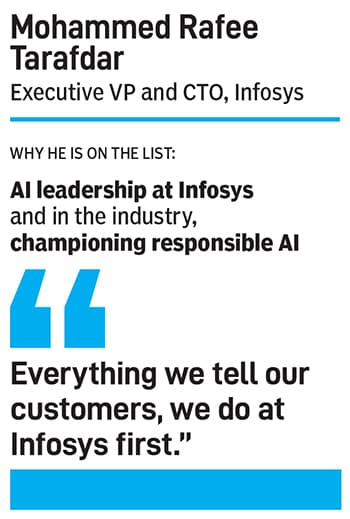Rafee Tarafdar: Transforming Infosys into AI-first company
The 20-year veteran of Infosys is widely recognised as an authoritative technology strategist in the tech services and consulting sector and is a champion of responsible AI


Rafee Tarafdar has spent more than 20 years at Infosys, where he is an executive VP and CTO. Tarafdar has emerged as the point person for Infosys’s transformation into an ‘AI-first’ organisation. He’s also widely recognised as an authoritative technology strategist in the tech services and consulting space, where Infosys, India’s second biggest provider, serves enterprise customers from America to Australia.
Tarafadar expects AI will increasingly be embedded into every aspect of work. At Infosys, already its impact is being felt in operations, software engineering and customer engagement. AI is being infused into internal productivity tools as well as client-facing solutions.
Over the last year, Infosys has built its own small language models tailored to specific industries such as banking and cybersecurity. “We have become one of a handful of companies in the world to create such models," Tarafdar says, pointing to Infosys’s transition from being a consumer of AI models to a developer.
These models are not general-purpose ones, he explains. They are finely tuned for real-world applications, integrated into solutions such as the company’s Product Assistant and Cyber Next platform, and “we are now looking at rolling them out to clients", he says.
 Because the models are maturing and generally widely available, “the focus is shifting to agents to drive a lot of process re-engineering", he says. While previously generative AI was used to augment people’s work, “it was not fundamentally changing the way things are done".
Because the models are maturing and generally widely available, “the focus is shifting to agents to drive a lot of process re-engineering", he says. While previously generative AI was used to augment people’s work, “it was not fundamentally changing the way things are done".
“Now with the combination of what we are already doing with deterministic (rule-based) automation, generative AI and agents, we are excited about what we can do to re-engineer processes and drive significant value beyond cost."
This improves Infosys’s ability to help its clients in creating new growth opportunities, he says. In this regard, Infosys has built more than 100 AI agents, ready to be deployed based on different client scenarios. These agents were designed based on patterns observed in different industries, in an out-of-the-box fashion.
Tarafdar has a degree in mechanical engineering and has spent close to three decades in the software industry. At Infosys, he founded and incubated the company’s Strategic Technology Group, a global team of more than 3,000 specialists. This group works on complex digital, cloud, and AI programs for Infosys’s enterprise clients and platforms.
He also led one of Infosys’s internal programmes called ‘Live Enterprise’ that has gone on to provide learnings for the company’s clients as well. Tarafdar co-authored a book The Live Enterprise: Create a Continuously Learning and Evolving Organization in 2021.
The CTO also leads Infosys’s Tech For Good programme, with projects in digital identity, health tech, and digital skilling.
Tarafdar sees a shift from knowledge-centric tasks—which are increasingly automated—to roles that demand first-principles thinking, problem-solving, and continuous learning.
“Being able to find problems and solve problems becomes the important thing at an individual level," he says. For teams, success now hinges on the ability to combine skilled engineering, new ways of working, and a relentless focus on business outcomes.
In the IT services sector, he notes that clients are increasingly looking for AI solutions that can help them go beyond cost and efficiency gains. They’re looking to overhaul their core business processes. For example, a custom GPT deployment at a bank has improved productivity by as much as 15 percent for more than 20,000 users.
Tarafdar offers another example of creating “exponential impact" with AI-led automation. One team within Infosys automated the entire lifecycle of developing a specific software application by capturing the “user journey" at a bank, and reduced the time needed to build it from a couple of person months to literally a click of a button.
While there will still be some human involvement in corrections, validations and so on “this is not about 10 to 20 percent but something significant".
In another example, early last year, Infosys set up an AI innovation lab for a bank in Europe that helped the bank to go well beyond improvements in productivity and efficiency of various teams to a number of opportunities, including customer onboarding, credit decisioning, and risk management—all related to core business processes.
In all of this, “responsible AI cannot be an afterthought", he says, and Infosys has set up a Responsible AI office, with protocols and guardrails covering 12 areas under the company’s ‘responsible by design’ approach towards its software and practices. The company’s approach has also achieved ISO certification, and much of its work in this area is open-sourced to foster industry-wide best practices.
“Everything we tell our customers, we do at Infosys first," he says.
First Published: Jun 19, 2025, 14:55
Subscribe Now